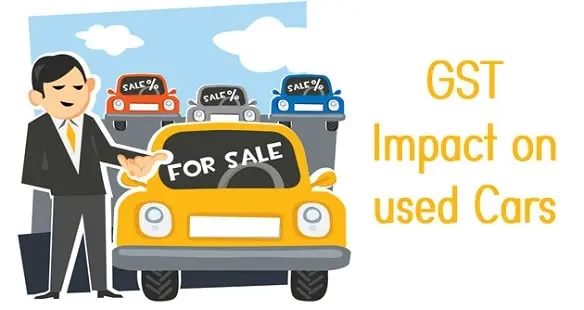The Impact of GST on The Used Car Market in India
India is the largest democracy thriving in every type of business. India is also a country that is about to cross China in population. So, it would not be wrong to say that people here have demands for a certain lifestyle. The automobile market has been very strong since companies like Kia, Hyundai, etc., started to come. But since the Covid 19, the used-car market has become even more famous, so it has expanded.
After applying GST or Goods Services Tax in 2017, the used car dealers must also pay the Central Government a considerable amount of GST. While some used car dealers need to pay the GST if a deal is profitable, the manufacturers are moving smoothly. So, this article explains how GST impacts the used car market in India.

What Is GST on Used Cars?
GST, as mentioned above, is a Goods and Services Tax implemented by the Central Government in 2017. It is added to the transaction value of the supply of various services and products. However, just because you need to provide GST does not mean that you, being a used car dealer, always need to provide GST to the Government.
Dealers of used cars can pay taxes on the margin of the transaction, that is, the difference between the buying and selling prices. If the car dealer does not get any profit, then that person does not have to pay the GST. But if the dealer gets a certain profit, then the GST is applicable.
Which Conditions Are Necessary for Levy of GST on Second-Hand Car for It to Impact Fully?
The GST can only impact car buying or selling if certain conditions are followed. Those are as follows:
- The used car supplier should indulge in the business enough that the person understands the buying and selling of second-hand cars well.
- The second-hand car, ready to be sold, should be in great condition. It should be in ‘as is’ condition, or it may undergo changes during servicing. However, it should not change the car’s nature.
- The supply of the used car should be taxable.
How Does GST Impact The Used Cars Based on Category?
How much GST you will pay on the used car depends on the category of the cars you are selling or buying. Here is a brief yet clear idea of that.
- Small Cars: If you are dealing with a small second-hand car like a Maruti Suzuki or Hyundai Grand i10, the GST imposed on these cars is 18%, which was 28% before.
- Luxury Cars: Luxury cars’ tax is much more than the smaller ones. For example, if you deal with a Lamborghini or BMW, the GST will be around 28%.
- Mid-size Cars: If you are dealing with a medium sized car like Tata or Honda Amaze, you need to pay 18% tax to the Government.
Also read:
The Impact of GST on Luxury Cars in India
GST is not the same for every car. It varies depending on the purchasing price, category and size. The GST imposed on luxury cars also greatly impacts the dealing of these cars. The rate of GST for any smaller luxury vehicle is 12% only if its engine capacity is up to 1200cc for petrol cars and 1500cc for diesel cars. However, if the engine capacity exceeds 1200cc for petrol cars and 1500cc for diesel cars, the applied GST is 18%.
The Impact of GST on The Automobile Industry of Second-hand Vehicles
Even though in the initial days, the imposing of GST has been problematic and confusing for the car dealers, in the long run, it has been effective for the manufacturers, dealers and consumers. Here is how the imposition of GST Has affected the automobile industry of the second-hand car market:
- Consumer: The tax payment for using a personal car has been huge in India. But since applying the GST, the total tax rate imposed for driving a used car has been reduced. It could become helpful for all the consumers.
- Manufacturer: Implementing GST on manufacturing cars has been especially useful for manufacturers. The cost of manufacturing has decreased due to this.
- Dealers: Earlier, people used to pay only the Value-added tax or VAT. But now, with the application of GST, used car dealers can claim taxes from the buyer or other dealers, which has become more profitable. While buying a second-hand car online , you can observe the difference.
The Application of Input Tax Credit Claims
If a dealer purchases a second-hand car from another dealer and collects the GST from the selling dealer, then the GST claimed by the purchasing dealer is called the Input Tax Credit. However, this claim is not available for all the cars. For example, a car with a seating capacity equal to or less than thirteen people does not have to provide the Input Tax Credit. If the capacity exceeds, only then can the claim be applicable. Also, this claim can only apply to vehicles having some specific purposes. Here are those:
- Demo Cars: No car dealer purchases a demo car. That is why they are treated as capital assets. These cars are valid for claiming ITC or Input Tax Claims.
- Cars for Business Purposes: Any car provided to the employees for business purposes is eligible for claiming Input Tax Claim. However, if an employee uses the car for personal use, the ITC cannot be claimed.
- Transport-Related Business: If someone purchases cars for transportation purposes, ITC applies to that particular vehicle.
- Rented Cars: The Government imposes GST on some rented cars. For example, if a car has a seating capacity of more than thirteen people and has been rented, the Input Tax Claim applies to that.
Also read: Top 10 Best Electric Vehicle Manufacturing Companies In India
Conclusion
GST, since its initiation, has become one of the most integral parts of any business. Automobiles have not been out of that, especially in the second-hand car market. The imposition of GST is visible in every used car. However, the fact that it varies depending on the size and category is also something to consider. Simply put, the impact of GST on the used car market is so significant these days that no car dealer can move an inch without it.


